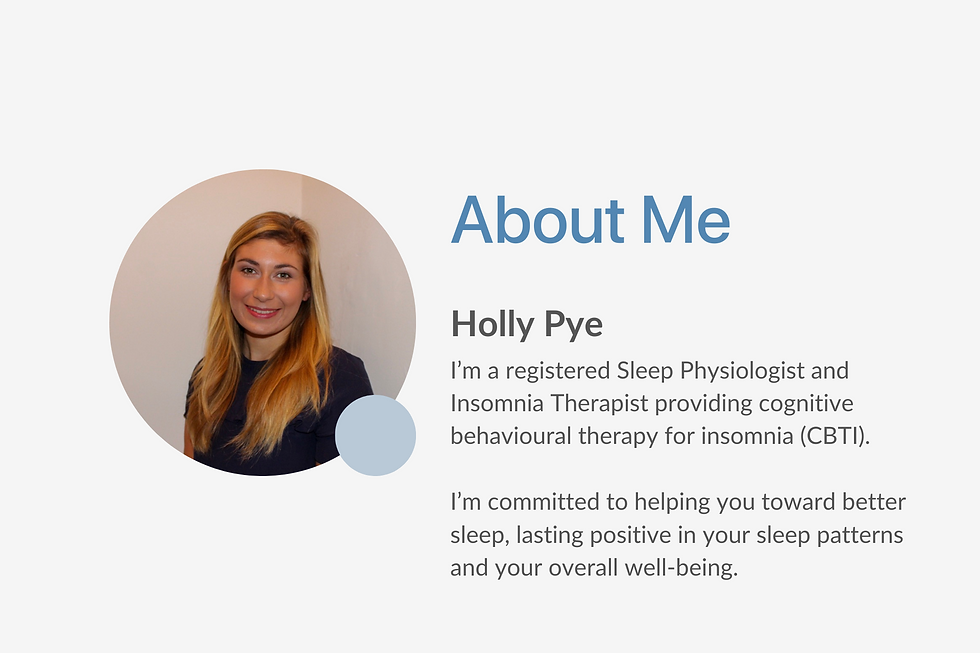Sleep Trackers for Insomniacs - Helpful or Harmful?
- Holly

- Mar 5, 2024
- 3 min read
In a world where technology strives to optimise our well-being, sleep trackers and smartwatches have become popular tools for monitoring and improving our sleep and overall health. However, for individuals battling insomnia, these devices may not be the helpful tool they appear to be.
Sleep trackers and smartwatches are wearable devices equipped with sensors to monitor various aspects of sleep. They typically use your movement, heart rate, and sometimes even environmental factors like room temperature to calculate the number of hours, the different stages, and the quality of your sleep. Many individuals use these devices to gain insights into their sleep patterns, hoping to enhance the quality and duration of their rest.
Accuracy
One of the main drawbacks of smart watches and sleep trackers is their questionable accuracy. While these devices provide general trends and data points, they often fall short when it comes to precise measurements. Factors such as movement in bed or irregular heart rate readings can contribute to inaccuracies, casting doubt on the reliability of the information they provide. The devices typically categorise sleep into basic stages like light, deep, and REM sleep. However, the accuracy of these categorisations is limited. Monitors capable of detailed sleep stage analysis, used in hospital and research settings, are sophisticated and expensive instruments costing thousands of pounds. Smartwatches, while providing insights into sleep stages, lack the precision necessary for clinical-grade assessments. For example, many people have concerns because their smartwatch indicates they aren't getting much deep sleep. In reality, the watch just isn't capable of accurately measuring deep sleep without electrodes placed on the scalp which allow us to look at brain activity and sleep stages.
Sleep Anxiety
Insomnia, often rooted in sleep anxiety, is a condition where individuals struggle to initiate or maintain sleep, leading to persistent sleep difficulties. Paradoxically, relying on sleep trackers can actually exacerbate this anxiety. It's easy to fixate on metrics such as the number of hours slept, becoming preoccupied with the data rather than focusing on how rested they feel after waking up. This heightened awareness and concern about sleep metrics often contribute to a vicious cycle of increased anxiety and worsened insomnia in the long run.
For individuals with insomnia, the attraction of knowing detailed sleep data may seem helpful but often masks the underlying cause of sleep anxiety. The constant monitoring and analysis of sleep metrics can heighten stress and contribute to a mindset where sleep becomes a performance metric rather than a natural, restorative process. The pressure to achieve the perfect sleep as determined by an app or device can hinder relaxation and perpetuate the very sleep difficulties the individual is trying to overcome.
While sleep trackers and smartwatches have become popular tools for optimising our sleep and overall health, their utility for individuals with insomnia is questionable. The accuracy of these devices, coupled with the potential to amplify sleep anxiety, raises concerns about their effectiveness in managing sleep disorders. In the real world, the only important thing is how well rested we feel after sleeping. Often, we'll feel better after having more quality sleep, and we'll feel worse after having low quality and quantity sleep. But these aren't general rules, and we don't need technology to mask our own judgement.
If you're struggling with getting enough quality sleep, it might be beneficial to have a more balanced and mindful approach. Instead of relying on sleep trackers, think about how you feel, what external factors lead to good and bad nights, establish a consistent sleep routine, optimise your sleep environment, and incorporate more relaxing activities into your daily life. Seeking guidance from healthcare professionals or sleep specialists can provide tailored strategies for managing insomnia. By addressing underlying factors, you can work towards achieving restful nights and improved sleep quality without becoming overly dependent on technology for sleep metrics.






コメント